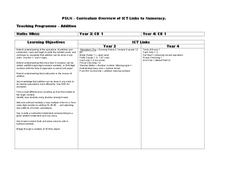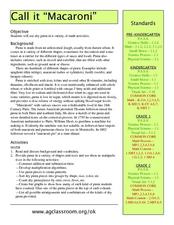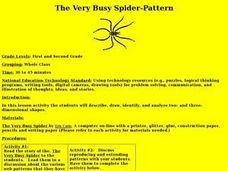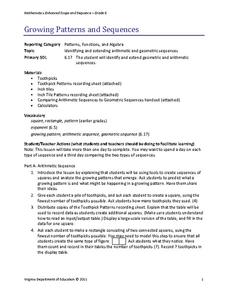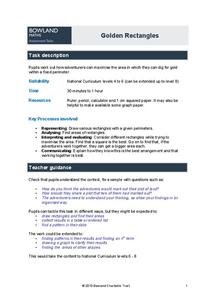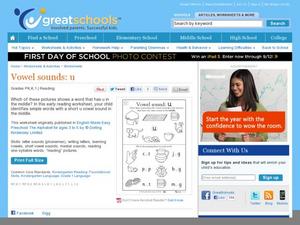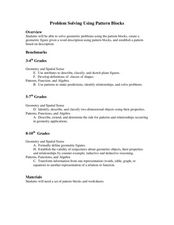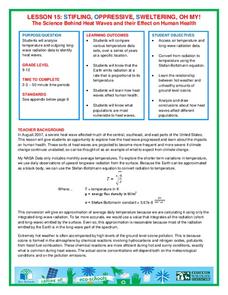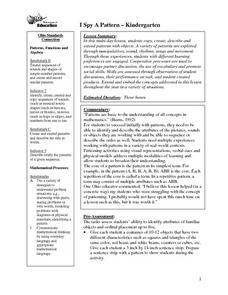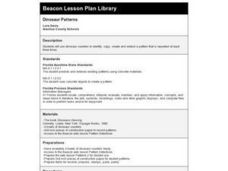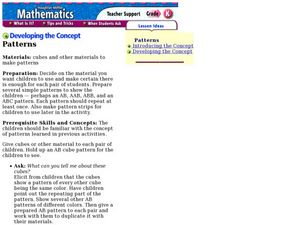Curated OER
Curriculum Links To Numeracy
Youngsters practice looking for the links to numeracy in their classes. This isn't a worksheet but a curriculum guide for an entire unit. Teachers can use any part of the resource to extend or inform their teaching practices related to...
Curated OER
Call it "Macaroni"
Who knew there were so many fun educational opportunities featuring pasta? Scholars read a brief informational text about the history of pasta (note that "macaroni" is spelled two different ways, so address this if kids are reading...
Curated OER
Repeating Digits in Addition
In this patterns worksheet, students solve 4 short answer problems. Students find the pattern of adding the digits one through nine and extend that pattern to natural numbers with the same digit in every place.
Curated OER
The Very Busy Spider-Pattern
Young scholars explore two- and three-dimensional shapes. For this very busy spider lesson, students read the story and then create a spider web pattern of their own. The webs must use a symmetrical pattern. Additional activities for...
Curated OER
Pattern Makers
Students are introduced to the notion of a repeating pattern. This is done by a number of means including the use of everyday objects. They are encouraged to create, describe and continue patterns.
Virginia Department of Education
Growing Patterns and Sequences
Learners explore, discover, compare, and contrast arithmetic and geometric sequences in this collaborative, hands-on activity. They build and analyze growing patterns to distinguish which kind of sequence is represented by a set of data...
Bowland
Golden Rectangles
Scholars must determine the maximum area for a rectangular plot of land enclosed with 100 meters of rope. As the work they discover patterns and numerical approaches to solve the problem.
Curated OER
Counting Forward or Back
What comes next? Young counters follow the stone path to each house, filling in numbers in a sequence as they go. Some of these move forward and some backward, but all progress by ones. Learners start with given numbers and then follow...
Curated OER
Vowel Sound: u
Which of these have /u/ as a middle sound? There are images of seven CVC words surrounding the letter u here, and scholars draw lines from the letter to words with the same middle phoneme. Be sure they know what these images are...
Curated OER
Patterns
Fourth graders investigate patterns and sequences. In this patterns and sequences lesson, 4th graders use a hundreds chart to build recurring patterns. Students skip count by threes and fives on a hundreds chart by coloring multiples...
Curated OER
Let's Explore Patterns
Second graders define the word pattern and other related vocabulary. They create a pattern independently. Students recognize and extend patterns. They explain how repeated patterns are made. Students explore several patterns on a...
Curated OER
A Matter of Pattern
Students will create and predict patterns formed when making paper snowflakes. Students will construct snowflakes understanding that patterns may be predicted based on observation.
Curated OER
Problem Solving Using Pattern Blocks
Students use pattern blocks to create a figure that is described to them and establish a pattern based on the description of the geometric figure. In this pattern blocks lesson plan, students fill out shape and fraction worksheets.
National Wildlife Federation
Stifling, Oppressive, Sweltering, Oh My!
Looking for a hot date? Pick any day in August, statistically the hottest month in the United States. The 15th lesson in the series of 21 instructs pupils to investigate the August 2007 heat wave through NASA data, daily temperature...
National History Day
“Saving the Bear”: The Russian Expeditionary Force of World War One
How have Russian politics affected countries on a global stage? The discussion of the Russian Revolution and World War I begins with an analysis of primary resource letters. Learners finish with a project where they create a timeline of...
Curated OER
VARVES: Dating Sedimentary Strata: Geology, Paleontological Patterns
Young scholars count the number of varves (annual layers of sediment) in shale billets, taken from the Green River Formation in Wyoming. The count is then extended to reflect the entire 260 meters of sediments where the billets originated.
Curated OER
Challenge: Zero Patterns
In this multiplication worksheet, students use mental math to solve 12 multiplication problems. Students find the product of 1 or 2 digit numbers multiplied by 2 or 3 digit numbers. Students use the multiplication pattern of counting...
Curated OER
Complete The Pattern
Students are introduced to various geometric and numeric patterns. In groups, they work together to determine the next object or number in the pattern. They record their answers on a worksheet and create their own pattern to give to a...
Curated OER
I Spy a Pattern-Kindergarten
Students copy, create, describe, and extend patterns with objects. They explore a variety of patterns through the use of manipulatives, sound, rhythms, songs and movement. Cooperative processes are used to encourage partner discussion.
Curated OER
Dinosaur Patterns
Students listen to story Dinosaurs Dancing, use dinosaur counters to identify, copy, create and extend pattern that is repeated at least three times, and complete web lesson plan.
Curated OER
Repeating Patterns
Students explore growth patterns by using manipulatives such as pattern blocks, investigate growth pattern of pattern, record growth in T-chart, describe how pattern is growing, and predict number of blocks needed to extend pattern.
Pennsylvania Department of Education
Extending Pattern Understandings
Students use shapes and manipulatives to demonstrate patterns. In this patterns lesson plan, students also break up patterns to identify a pattern unit.
Curated OER
Developing the Concept: Patterns
Students understand what a pattern is and how to make a pattern. In this pattern instructional activity, students use cubes to create various patterns. Students recognize the pattern created.
Curated OER
Patterns and Sequences
Sixth graders explore pattern recognition and sequencing. They create arithmetic and geometric sequences with colors, shapes, and numbers. Students write expressions of arithmetic sequences and geometric sequences to find the nth term.


